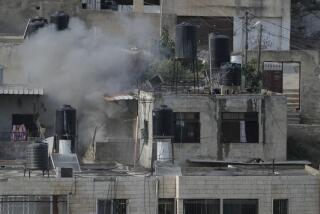New rape allegation adds to Iraqi uproar
- Share via
MOSUL, IRAQ — A second Iraqi woman emerged Thursday accusing the nation’s security forces of rape, further breaking a taboo about disclosing sexual violence and undermining public perceptions about Iraq’s police and military.
The Sunni Muslim woman alleged that Shiite soldiers raided her house in the northern city of Tall Afar, interrogated her and raped her repeatedly while videotaping the attack. She also said the soldiers threatened to assault her two teenage daughters before one soldier intervened.
Her case and another Sunni woman’s rape allegations this week have stirred outrage in Iraq about a rarely discussed crime that was said to have occurred frequently before the fall of President Saddam Hussein. The former government’s security forces systematically raped Iraqi women, say local and international human rights activists.
“Before, when Iraqi women were subject to rape, they at least knew who was doing it,” said Zainab Nomani, a Shiite Muslim lawyer and human rights activist who heads an organization in Hillah and Baghdad that helps widows, divorced women and victims of sexual violence. “Now, it is unknown.”
A videotape of the woman, who was covered in a black abaya, or robe, and spoke directly to the camera, appeared on Al Sharqiya, a popular Sunni-controlled television station. Her voice was not broadcast.
About 150 residents of this northern city held a demonstration Thursday morning to denounce the government’s response to the rape allegations.
On Monday, a 20-year-old woman who calls herself Sabreen alleged in a television interview that she was raped by three Shiite Iraqi police officers during a weekend raid in her west Baghdad neighborhood.
The government of Prime Minister Nouri Maliki rejected Sabreen’s allegations, praised the policemen and labeled her a liar and an insurgent collaborator wanted by authorities. U.S. officials said they were not aware of any arrest warrants for her.
In an audio recording posted on the Internet, the leader of Al Qaeda in Iraq said hundreds of volunteers had asked to take part in suicide attacks after hearing about the alleged rape.
Sabreen’s allegations raised suspicions of a well-timed and well-placed effort by Sunnis to sabotage public faith in a U.S.-Iraqi security crackdown that began last week.
But the claim of the second woman, a Sunni member of Iraq’s Turkmen minority, doesn’t fit neatly into such a suspicion. Tall Afar, 50 miles from Mosul, is a town populated mostly by ethnic Turkmen, both Shiites and Sunnis.
District Commissioner Najim Abdullah Jabouri recounted the woman’s story in a telephone interview with The Times.
The woman, a mother of two in her late 30s, alleges that on Feb. 8, at least eight men, mostly Iraqi soldiers, entered her home. They locked her two teenage daughters in another room, Jabouri said, and repeatedly raped her while one of them videotaped the attack.
Later, the troops turned their attention to the daughters, Jabouri said. But one of the soldiers pulled out a gun and threatened to open fire if the other men touched the girls, Jabouri said.
When the soldiers left, the woman took her daughters through the streets of her neighborhood telling people to beware of the soldiers, Jabouri said.
Local Sunni tribal leaders complained to police, who launched an investigation and detained eight men, said Sheik Mohammed Khalaf Hanash, leader of the Sunni Council of Tall Afar.
The alleged victim, accompanied by more than a dozen Sunni tribal leaders, went to a police station and identified the assailants, pointing out the man who protected her daughters, Hanash said.
“The case has now been turned over to the courthouse,” he said.
The woman has been named by Iraqi television. She had stayed out of public view until Sabreen’s case made headlines.
The rape claims have heightened sectarian tensions and deepened Sunnis’ mistrust of the Shiite-dominated security forces. But Army Maj. Gen. William B. Caldwell IV, the chief U.S. military spokesman in Iraq, advised people to not allow the allegations to tarnish all Iraqi soldiers and police officers.
“Because there’s two or three that are alleged to have done something wrong should not be taken and made as an allegation against the entire force,” Caldwell said Wednesday. “There are brave Iraqi soldiers out there each day, both Iraqi army soldiers and Iraqi police soldiers, who are doing their mission.”
Human rights activists and judges said members of Hussein’s security forces systematically raped female prisoners. In the Kurdish town of Sulaymaniya, rebels who stormed a security office in 1991 found videotapes of Hussein’s intelligence and security officials raping women in a basement dungeon.
Kurdish and Shiite female prisoners during the Hussein regime have testified in recent human rights cases against the former Iraqi president and his deputies. Their faces hidden and voices digitally altered, they have told of being raped in prison.
Rapes continue, said Nomani, the human rights activist.
“Many women have been subject to kidnap and rape,” she said. “And they don’t have the courage to speak about it.”
She cited the case of a 16-year-old girl and her younger sister, kidnapped while walking to school in Baghdad last year. The girl managed to escape her captors, who had repeatedly raped her, but her sister has not been found.
Her shamed family had to sell its house, and the girl has developed serious mental problems. “She’s so depressed that she’s sick,” Nomani said.
Times staff writer Daragahi reported from Baghdad and special correspondent Al-Zarary from Mosul.
More to Read
Sign up for Essential California
The most important California stories and recommendations in your inbox every morning.
You may occasionally receive promotional content from the Los Angeles Times.












